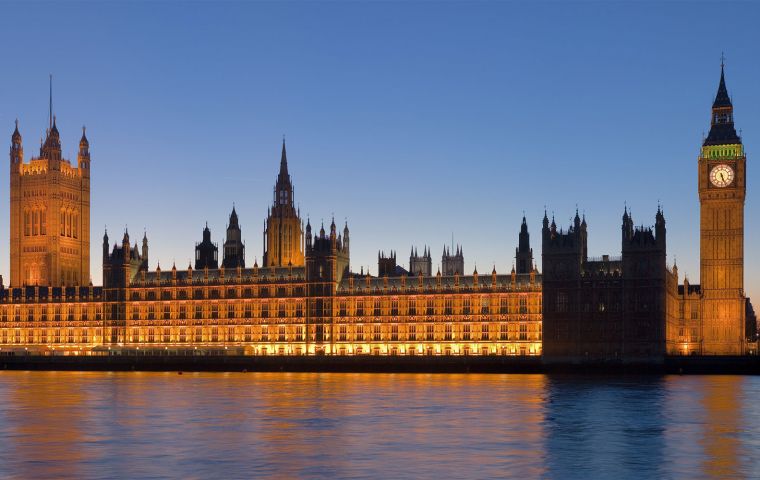MercoPress. South Atlantic News Agency
UK controversy over tactical voting; reform campaigners want proportional representation
 Elections for Westminster Parliament use the “first-past-the-post” system - under which the party that gains the most MPs, rather than the most votes overall, wins.
Elections for Westminster Parliament use the “first-past-the-post” system - under which the party that gains the most MPs, rather than the most votes overall, wins.  The Electoral Reform Society branded the poll a “hold your nose election,” claiming 6.5 million voted tactically rather than for what they believed in.
The Electoral Reform Society branded the poll a “hold your nose election,” claiming 6.5 million voted tactically rather than for what they believed in.  “For the third time in a row, Westminster's voting system has failed to do what it says on the tin - produce a strong and stable government,” said Darren Hughes. (Pic Gus Palmer)
“For the third time in a row, Westminster's voting system has failed to do what it says on the tin - produce a strong and stable government,” said Darren Hughes. (Pic Gus Palmer) Tactical voting reached a new peak at June's general election as voters tried to get round a failed system, according to electoral reform campaigners. The Electoral Reform Society branded the poll a “hold your nose election,” claiming 6.5 million voted tactically rather than for what they believed in.
The Conservatives would have won a majority if just 0.0016% of voters had chosen differently, it found. The ERS campaigns for the introduction of proportional representation.
Elections for the Westminster Parliament use the “first-past-the-post” system - under which the party that gains the most MPs, rather than the most votes overall, wins.
June's general election, in which Conservative leader Theresa May lost her Commons majority, saw an apparent return to two-party politics as more than 80% of voters cast a ballot for either the Conservatives or Labour.
But a BMG survey of just over 2,000 voters, shortly before polling day, suggested “voters did not flock back to the two largest parties with enthusiasm,” according to an ERS analysis. Some 20% of those surveyed said they would be choosing the candidate that was most likely to beat the one they disliked, it suggested.
“This is over double the proportion who said they would do so in 2015,” said the ERS report. “Projecting this onto actual turnout would equate to nearly 6,500,000 people voting tactically,” it explained.
The ERS claims the “first-past-the post” system exaggerated political divisions because of the huge discrepancy in the number of votes cast in an area for a party and the number of seats it won.
For instance, Labour won 29% of votes cast in the South East of England but got just 10% of seats, while Conservatives won 34% of the North East but returned just 9% of seats, according to the research.
“For the third time in a row, Westminster's voting system has failed to do what it says on the tin - produce a strong and stable government,” said the ERS chief executive, Darren Hughes.
“June's election has shown first-past-the-post is unable to cope with people's changing voting habits - forcing citizens and parties to try and game the system.
”This surge in tactical voting - double the rate of 2015 - meant voters shifted their party allegiances at unprecedented rates, with the second highest level of voter volatility since the inter-war years,“ Mr. Hughes added.
Hughes said a system ”designed for two parties“ was not up to the job of accommodating the ”complex electoral swings“ seen in modern elections. ”The vast majority of votes are going to waste, with millions still stuck in the electoral black hole of winner-takes-all.“
The ERS repeated its call for a new system to be introduced to stop votes being wasted or voters being forced into tactical decisions.
A spokeswoman for the Cabinet Office, which sets electoral rules, said: ”First past the post is a voting system that offers a robust method of electing MPs. A referendum on changing the voting system for general elections was held in 2011 and the public voted overwhelmingly in favor of keeping the first past the post system,” she added.
If the referendum had gone the other way, and the Alternative Vote method had been introduced, Labour would have been chief beneficiaries in 2017, gaining 24 seats, while in 2015 the Conservatives would have doubled their majority from 12 to 24, according to research by YouGov, which asked more than 13,000 people how they would have voted under different electoral systems.




Top Comments
Disclaimer & comment rules-

-

-

Read all commentsKipper/Hepatia
Aug 23rd, 2017 - 02:36 pm +3People like YOU are the very reason this stories appear on Mercopress. You just can't resist clicking on the story and commenting.
The more views they get the more money they make from their sponsors.
It's not rocket science.
Perhaps if you departed from this forum they wouldn't bother putting such stories on the site.
However, we all know that you Argentine trolls can't pass up the chance to vent your spleen at anyone you believe will listen. So the more stories regarding the UK and the Falklands that they put on here, the more views they get from 'angry' Argentine trolls and the more money they make.
The question you should be asking yourself is why are you propping up these sites if you object to their content so vehemently?
Demon Tree
Aug 23rd, 2017 - 09:06 am +2Smart? Doesn't that depend on your definition of smart?
Lets face it there will be a high number of students in that voting pool. Are they smarter than other people? Why? Because they're at University?
Perhaps in some respects. However you tend to find that the majority of University students might be intellectually smarter about some things, but tend not to have emotional intelligence. This is why when people are younger they tend to only see things in black and white, and there is no compromise, and also in their opinion if they're right then everyone else must be wrong.
Emotional intelligence is something that develops over time with experience, which is why when the majority of these people leave University and live in the real world their world view changes dramatically.
So no, people in these cities aren't necessarily smarter than people anywhere else...they just arrogantly believe that they are.
The main problem with the Electoral Reform Society is that they don't understand human nature, especially British human nature.
Aug 22nd, 2017 - 08:48 am +1People have been talking about electoral reform in the UK form more than 100 years, but there is a reason that nothing has ever happened...the people of the UK don't want it to.
Now before people come on here shouting about the article and the results of its ridiculously small polling sample, etc... let me explain.
In theory proportional representation sounds great, doesn't it? It is certainly a fairer system than 1st past the post...there is no denying that. And most people would probably agree with that. However the realities of having PR aren't as palatable to the British voting public as the theory is.
You see since people vote for MPs standing in their relevant constituencies, with whomever getting the greater vote winning (regardless of how many votes the overall party gets), they won't accept that the Labour/Conservative/Green/Independent etc... MP that got the most votes may not actually 'get in' under PR. They may end up with an MP from a party that didn't actually do that well in their area at all, but the party did well overall in a country wide tally.
And the British people won't stand for that. After all its THEIR MP. They decide on THEIR MP, not a bunch of unelected people tallying up overall votes and dictating which MP they'll have.
Hence why the AV referendum vote failed, and no doubt why any attempt to introduce a PR referendum would similarly fail.
British people tend to get quite intransigent about things like that.
Commenting for this story is now closed.
If you have a Facebook account, become a fan and comment on our Facebook Page!